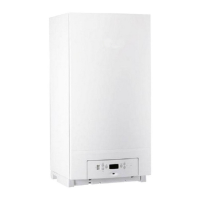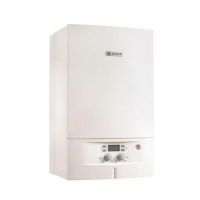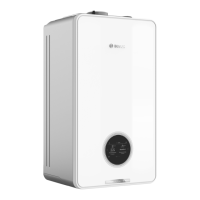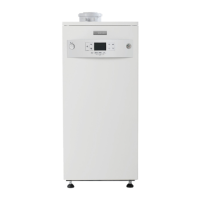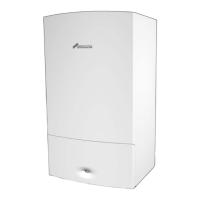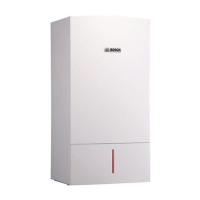Explanation of symbols and safety instructions
3
Condens 7000 WP – 6721841196 (2022/01)
System malfunctions, malfunctions and defects of
system components resulting from the use of third-
party equipment are excluded from liability.
Service work required to repair the damage will be
invoiced.
H If you smell gas
A gas leak could potentially cause an explosion. If you
smell gas, observe the following rules:
▶ Prevent flames or sparks:
– Do not smoke, use a lighter or strike matches.
– Do not operate any electrical switches or unplug
any equipment.
– Do not use the telephone or ring doorbells.
▶ Turn off the gas at the meter or regulator.
▶ Open windows and doors.
▶ Warn your neighbours and leave the building.
▶ Prevent anyone from entering the building.
▶ Move well away from the building: call the National
Gas Emergency Service on 0800 111 999.
▶ L.P.G. boilers: Call the supplier’s number on the
side of the gas tank.
H Danger to life from poisoning by flue gas
There is a danger to life from escaping flue gas.
▶ Never modify any parts through which flue gas is
routed.
If flues are damaged or leaking, or if you smell flue gas,
observe the following rules.
▶ Switch off the heat source.
▶ Open doors and windows
▶ Warn your neighbours and leave the building
immediately.
▶ Prevent third parties from entering the building.
▶ Notify an approved contractor.
▶ Have any defects rectified.
H Danger to life from carbon monoxide
Carbon monoxide (CO) is a poisonous gas, which
arises during the incomplete combustion of fossil fuels
such as oil, gas or solid fuels.
Dangers arise, if carbon monoxide escapes from the
heating system due to a fault or a leak and collects
unnoticed in enclosed spaces.
You can neither see, taste nor smell carbon monoxide.
To avoid danger from carbon monoxide:
▶ Have the heating system inspected and serviced
regularly by an approved contractor.
▶ Use a CO detector, which gives an alarm in good
time if CO escapes.
▶ If you suspect a CO leak:
– Warn your neighbours and leave the building
immediately.
– Call an approved contractor.
– Have any defects rectified.
H Inspection and service
The system operator is responsible for ensuring the
heating system is used safely and in an
environmentally-sustainable manner.
If maintenance or inspections are omitted or
incorrectly carried out, this can cause personal injury
and even danger to life or material damage.
▶ Bear in mind the following points in particular:
– Point out that modifications or repairs may be
carried out only by an approved contractor.
– To ensure safe and environmentally compatible
operation, an inspection, and also cleaning and
maintenance as required, must be carried out
within the specified time period.
▶ Have the necessary maintenance carried out
directly.
▶ Have defects in the heating system rectified
immediately irrespective of the annual inspection.
H Inspection and maintenance interval
To ensure the wall mounted gas condensing boiler
works correctly and safely, the following intervals
must be adhered to:
• Inspection: annually,
• Maintenance: every 2 years or following a burner
runtime of 4000 hours (depending on which occurs
first).
H Conversion and repairs
Improper modifications to the heat source or other
parts of the heating system can result in personal
injury and/or material damage.
▶ Have work carried out only by an approved
contractor.
▶ Never remove the casing of the heat source.
▶ Never carry out any modifications to the heat
source or to other parts of the heating system.
▶ Never close the outlet of the pressure relief valves.
Heating systems with DHW cylinder: During heat-
up, water can escape from the pressure relief valve
of the DHW cylinder.
H Open flue operation
The installation location must be adequately
ventilated, if the heat source draws its combustion air
from the room.
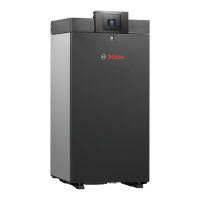
